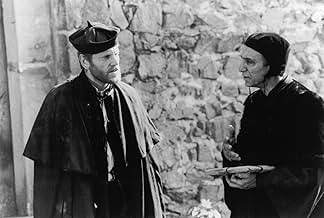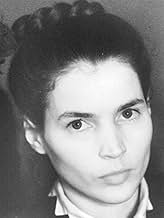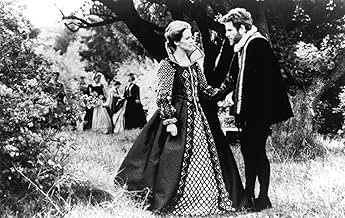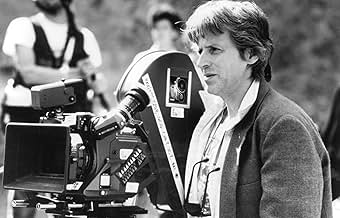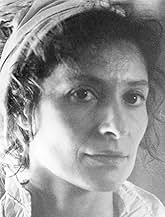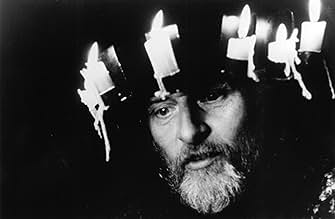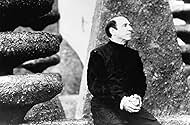NOTE IMDb
5,8/10
3,3 k
MA NOTE
Ajouter une intrigue dans votre langueNostradamus (1503-66) was a French doctor, astrologer and seer during the Inquisition, successful in treating patients during an outbreak of plague.Nostradamus (1503-66) was a French doctor, astrologer and seer during the Inquisition, successful in treating patients during an outbreak of plague.Nostradamus (1503-66) was a French doctor, astrologer and seer during the Inquisition, successful in treating patients during an outbreak of plague.
- Réalisation
- Scénario
- Casting principal
Maia Morgenstern
- Helen
- (as Maja Morgenstern)
Oana Pellea
- Landlady
- (as Oana Pelea)
Avis à la une
I watched this movie in 1998 and would like to know whether this movie told exactly about his life. Although i never read the prophecy of Nostradamus but i am amazed that he can know that there will be three world war. The fact is there were two already and the third one, we still can't judge it by ourselves. What i have to say is an excellent movie with huge casts and it has been narrated carefully by the writer and producer. Why not a remake? Will that be better?
I personally thought that this movie was one of the better period pieces that are around. I felt that the actor playing Nostradamus did a wonderful job trying to portray a very illusive figure in our history books. Not many people (including historians) agree on what Nostradamus' personality type exactly was, so for this actor to portray anything at all is somewhat impressive to me... But, I do have to admit that the artistic attempts near the end (especially the vision of the future at the very last scene) were a bit much. I think that although it was important to get the point across that he was a visionary... that it should have been done throughout the piece... not just at two points throughout the whole film (during the carriage ride and at the end)... But, hat's off for trying!
One thing that I'm extremely interested in knowing is if his first wife (played by Julia Ormond) was really arrested by the Inquisition for having some Arabian Mysticism book... and if so... what was the title of the book!? I kept re-winding to get the name, but could not understand what she was saying! I keep trying to find any hint of this story online, but unfortunately have no luck... if anyone knows what book she supposedly had in the movie (or in real life), PLEASE e-mail me... I'm EXTREMELY interested in finding out about it!
C-ya, Stephen
One thing that I'm extremely interested in knowing is if his first wife (played by Julia Ormond) was really arrested by the Inquisition for having some Arabian Mysticism book... and if so... what was the title of the book!? I kept re-winding to get the name, but could not understand what she was saying! I keep trying to find any hint of this story online, but unfortunately have no luck... if anyone knows what book she supposedly had in the movie (or in real life), PLEASE e-mail me... I'm EXTREMELY interested in finding out about it!
C-ya, Stephen
Tcheky Karyo, most familiar to American audiences as Bob, the enigmatic secret agent by way of Pygmalion in Luc Besson's NIKITA, has his first English-language lead role as the 16th-century physician and prophet Michel de Nostradame, who predicted various events occurring hundreds of years into the future.
Filmed in Romania, the film is a grim, grubby depiction of the renaissance era, but seldom reaches any moments of true insight into Nostradamus' life. Instead of taking a scholarly approach required of the subject, and concentrating on the man's vision, director Roger Christian (whose claim to fame is being the art director on Ridley ScottÕs ALIEN and directing the pretty much forgetable horror flick THE SENDER) panders to the lowest common denominator by focusing on his love life, and his run-ins with pugnacious Inquisitors.
When he is shown having his prophetic visions, most of the sequences are stilted and hokey. Only one prediction sequence has any power, the vision of the Black Rain, filmed in Copsa Mica, which the National Geographic Society once branded as the most polluted city in Europe.
Academy Award Winner F. Murray Abraham (AMADEUS), called in to save the acting day, does serviceable work as Scalinger, Nostradamus' sometime mentor, and Rutger Hauer is weird and funny as the Mystic Monk. Do I hear laughs? His turn is actually quite enjoyable, with his candle-lit hat and his demolition of the loathsome flagellates.
Karyo consorts with a bevy of bold European actresses, including Julia Ormond, Maia Morgenstern (THE OAK), and Assumpta Serna (MATADOR, THE FENCING MASTER.) He makes a noble effort with his calm, cultivated, at times endearing performance but he can't carry the whole film.
The movie eventually dissipates in the scarcity of its low budget, borrowing footage (ironically enough) from ALIENS for its final sequence which depicts space travel.
Filmed in Romania, the film is a grim, grubby depiction of the renaissance era, but seldom reaches any moments of true insight into Nostradamus' life. Instead of taking a scholarly approach required of the subject, and concentrating on the man's vision, director Roger Christian (whose claim to fame is being the art director on Ridley ScottÕs ALIEN and directing the pretty much forgetable horror flick THE SENDER) panders to the lowest common denominator by focusing on his love life, and his run-ins with pugnacious Inquisitors.
When he is shown having his prophetic visions, most of the sequences are stilted and hokey. Only one prediction sequence has any power, the vision of the Black Rain, filmed in Copsa Mica, which the National Geographic Society once branded as the most polluted city in Europe.
Academy Award Winner F. Murray Abraham (AMADEUS), called in to save the acting day, does serviceable work as Scalinger, Nostradamus' sometime mentor, and Rutger Hauer is weird and funny as the Mystic Monk. Do I hear laughs? His turn is actually quite enjoyable, with his candle-lit hat and his demolition of the loathsome flagellates.
Karyo consorts with a bevy of bold European actresses, including Julia Ormond, Maia Morgenstern (THE OAK), and Assumpta Serna (MATADOR, THE FENCING MASTER.) He makes a noble effort with his calm, cultivated, at times endearing performance but he can't carry the whole film.
The movie eventually dissipates in the scarcity of its low budget, borrowing footage (ironically enough) from ALIENS for its final sequence which depicts space travel.
Michel de Nostredame, generally known as Nostradamus, was a sixteenth-century French physician, but is better known today as a reputed prophet and seer. His fame rests on a series of gnomic quatrains which, it has been claimed, contain predictions of future world events, including wars, political changes and natural disasters. The problem is that his quatrains are written in a language so obscure that they can be interpreted to mean virtually anything. Those who seek to interpret them generally do so with the benefit of hindsight, seeking to prove that Nostradamus predicted World War II, the atomic bomb, 9/11 or whatever; those seeking to use his works to foretell events which have not yet happened tend to come badly unstuck. Even when a particular quatrain can be "proven" to have predicted a particular event, this is normally done with the help of some creative rewriting or creative mistranslating of his words. (Anyone with any knowledge of the French of the period can find some spectacular examples of this on the internet, particularly those interpretations which try to prove that by "Hister"- a Classical name for the River Danube- Nostradamus meant "Hitler").
The obscurity of Nostradamus' prophecies was quite deliberate; had he clearly and unambiguously foretold specific events which then failed to occur, his reputation as a seer would have been destroyed for ever. The film, however, would have us believe that he deliberately obscured his meaning in order to ward off the attentions of the Church, although in the sixteenth century attempts to foretell the future were not forbidden and, indeed, astrology was regarded as an intellectually respectable, and theologically permissible, science.
As might be clear from my opening paragraph, I personally do not believe that Nostradamus possessed a supernatural power to foretell the future. (Indeed, I do not believe that any human being possesses or has possessed such a power). In the original French, his verses have a certain surrealist inventiveness, but I have never seen any reason to attribute any other significance to them. This film, however, is quite openly made on the assumption that its hero did indeed possess prophetic gifts; I was left with the definite feeling that Roger Christian was asking me to accept that Nostradamus really was a man tormented by horrifying visions of the future and whose prophecies were intended as warnings to mankind of the fate that awaited them.
Now I normally leave my scepticism about the supernatural at the cinema door; I have never, for example, allowed the fact that I do not believe in witchcraft to prevent me from enjoying the Harry Potter films. Suspension of disbelief, however, is something I find easier to accomplish in the context of a wholly fictional story than in the context of a biography of a real individual. Neither J K Rowling nor the makers of the "Potter" films are, after all, asking me to accept that witchcraft has any existence outside the realm of fiction, but when a film-maker asks me to give credence to the writings of a sixteenth-century charlatan I find it difficult to take his film seriously.
"Nostradamus" has other weaknesses, quite apart from its flawed central premise. Unlike many period dramas, this one is not particularly visually attractive, with dull, muddy colours. The action is slow-moving and at times difficult to follow. I understand that Tchéky Karyo is a well-known and respected actor in France, indeed the winner of a Cesar Award, so I presume that he can act in his own language far better than he can in English. (I have never seen any of his French-language movies apart from "Le Retour de Martin Guerre", in which he only had a small part). In the leading role here he is absolutely horrible, dull and wooden without any convincing attempt to convey emotions. Some of the supporting cast are better, including Julia Ormond as Nostradamus' wife, although I was left with the feeling that F. Murray Abraham had come down a long way since "Amadeus" and Rutger Hauer equally far since "Blade Runner". This was the first of Roger Christian's films I have seen, and I cannot say that it has inspired me with any great desire to explore his work further. 4/10
The obscurity of Nostradamus' prophecies was quite deliberate; had he clearly and unambiguously foretold specific events which then failed to occur, his reputation as a seer would have been destroyed for ever. The film, however, would have us believe that he deliberately obscured his meaning in order to ward off the attentions of the Church, although in the sixteenth century attempts to foretell the future were not forbidden and, indeed, astrology was regarded as an intellectually respectable, and theologically permissible, science.
As might be clear from my opening paragraph, I personally do not believe that Nostradamus possessed a supernatural power to foretell the future. (Indeed, I do not believe that any human being possesses or has possessed such a power). In the original French, his verses have a certain surrealist inventiveness, but I have never seen any reason to attribute any other significance to them. This film, however, is quite openly made on the assumption that its hero did indeed possess prophetic gifts; I was left with the definite feeling that Roger Christian was asking me to accept that Nostradamus really was a man tormented by horrifying visions of the future and whose prophecies were intended as warnings to mankind of the fate that awaited them.
Now I normally leave my scepticism about the supernatural at the cinema door; I have never, for example, allowed the fact that I do not believe in witchcraft to prevent me from enjoying the Harry Potter films. Suspension of disbelief, however, is something I find easier to accomplish in the context of a wholly fictional story than in the context of a biography of a real individual. Neither J K Rowling nor the makers of the "Potter" films are, after all, asking me to accept that witchcraft has any existence outside the realm of fiction, but when a film-maker asks me to give credence to the writings of a sixteenth-century charlatan I find it difficult to take his film seriously.
"Nostradamus" has other weaknesses, quite apart from its flawed central premise. Unlike many period dramas, this one is not particularly visually attractive, with dull, muddy colours. The action is slow-moving and at times difficult to follow. I understand that Tchéky Karyo is a well-known and respected actor in France, indeed the winner of a Cesar Award, so I presume that he can act in his own language far better than he can in English. (I have never seen any of his French-language movies apart from "Le Retour de Martin Guerre", in which he only had a small part). In the leading role here he is absolutely horrible, dull and wooden without any convincing attempt to convey emotions. Some of the supporting cast are better, including Julia Ormond as Nostradamus' wife, although I was left with the feeling that F. Murray Abraham had come down a long way since "Amadeus" and Rutger Hauer equally far since "Blade Runner". This was the first of Roger Christian's films I have seen, and I cannot say that it has inspired me with any great desire to explore his work further. 4/10
This is a real great movie about the Life of Nostradamus,if true or not, well that`s another question,but here you have some real great actors in very good roles first of all T.Karyo as Nosdradamus,he played the way as somebody who`ve lived all those things.In another role you have Rutger Hauer one of the best and underestimated actors in the Whole world in my opinion(have a look at Hitcher,Blade Runner,Soldier of Orange),he stars as the mystik monk only appears a few minutes but impresses a lot more.The Cast was filled up with F. Murray Abraham,A. Plummer and a lot more ofgreat actors,this all was mixed with some very good special effects(Nostradamus Visions)and good screenplay,wonderfull combine to an excellent picture by R.Christian(who also worked on Star Wars).A clear 10 out of 10 for me.
Le saviez-vous
- AnecdotesRutger Hauer and F. Murray Abraham appeared in Surviving the Game (1994).
- GaffesNostradamus is showing his son how to use a divining rod to find underground water and says that there is water 4 meters below, but the metric system wasn't invented until 1799 (roughly 160 years later).
- Citations
The Mystic Monk: Light the candle at the bottom of your heart.
Meilleurs choix
Connectez-vous pour évaluer et suivre la liste de favoris afin de recevoir des recommandations personnalisées
- How long is Nostradamus?Alimenté par Alexa
Détails
Box-office
- Budget
- 20 000 000 DEM (estimé)
- Montant brut aux États-Unis et au Canada
- 364 164 $US
- Week-end de sortie aux États-Unis et au Canada
- 27 312 $US
- 18 sept. 1994
- Montant brut mondial
- 364 164 $US
Contribuer à cette page
Suggérer une modification ou ajouter du contenu manquant

Lacune principale
By what name was Nostradamus (1994) officially released in India in English?
Répondre
